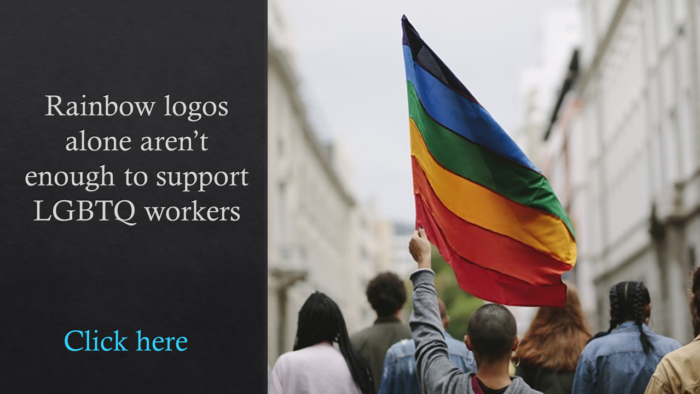“Hiring is hard.” That’s the stated reason Katrina Kibben created Three Ears Media—which coaches HR and recruiting leaders—and, 12 years later, the struggles associated with hiring couldn’t be more profound.
While HR leaders today are laser-focused on recruiting and retaining in the challenging market, they can’t lose sight that such work needs to be done with an eye toward inclusion for all, says Kibben. Kibben, who came out as transgender last year, says that while some companies have made progress recently toward more trans-affirming cultures through efforts like heightened awareness of pronoun selection, the real work is just beginning. And it’s needed now more than ever, they say, as initiatives like Florida’s “Don’t Say Gay” law advance and employers are increasingly put in the spotlight for their advocacy—or lack thereof—on critical social issues.
With Trans Day of Visibility coming up on March 31, HRE recently spoke with Kibben—who is redefining what it means to be a remote employee by living and working out of their van—about what employers can do to celebrate and advance trans visibility.
HRE: What kind of trends have you seen in recent years in terms of corporations embracing genuine trans inclusion?

Kibben: More than ever, companies are actually taking the time to understand what inclusion means during every part of the candidate and employee experience. It’s more than adding pronouns to your email signature. It’s actually integrating it into your application process, then training the team to use pronouns and ask for them at the interview. It’s training your executives on how to have these conversations. It’s actually considering that your benefits program may not be inclusive to trans people and understanding what it takes and how it works for people to transition safely, medically and still have the support of the company via their healthcare benefits.
HRE: Do you think those movements are encouraging? Where is there the most room for improvement?
Kibben: I think it is encouraging as a trans person, but I know that there’s still a lot of frustration for people in companies where there is no motion, just the gesturing of adding a pronoun to an email signature. That’s a great start—don’t get me wrong—but it’s not actually a move toward belonging because it doesn’t change how trans people are able to interact safely at your company.
See also: Want to improve trans inclusion? Look to allyship, accountability
 HRE: Given that Trans Day of Visibility is approaching March 31, what role do you think the visibility of trans people and issues can play in building company culture where LGBTQIA employees feel welcomed? Can you speak to your own experiences?
HRE: Given that Trans Day of Visibility is approaching March 31, what role do you think the visibility of trans people and issues can play in building company culture where LGBTQIA employees feel welcomed? Can you speak to your own experiences?
Kibben: Absolutely. I have stayed in the closet in every corporate environment.
I know what it feels like to hide in plain daylight. I also understand how that impacts the work that we do every day. You’ll never do your best work if you are hiding something very important about your life and someone you love. And so, when I think about Trans Day of Visibility, it’s about making safe places for everyone and considering how we make each other feel safe at work. It’s not necessarily parades or creating, you know, a bunch of flags to print out and put on your doors for a day.
HRE: For HR professionals looking to make real, sustainable progress on trans inclusion, what is the most important thing they need to keep in mind as they press for change?
Kibben: That they will come up against resistance and that they must be brave—on behalf of other people.
Recently, I was talking to my mentor and she shared a scenario where years ago she helped a trans person transition at work. She went back to that person almost 10 years later and asked how she could have been better. And I think it’s absolutely brave that she even asked the question, but the person told her a lot of things that she did wrong. And so even with all of that good intent, considering this was 10 years ago, she’s coming back asking, hands open, “Tell me what I did wrong,” knowing that her intent was to create this incredible scenario for this person. You have to understand that it won’t be perfect, but progress is better than perfection.
Related: 5 ways to create a safe workplace culture for LGBTQ employees
HRE: What should corporations be doing to combat legislative measures that seek to restrict the visibility of LGBTQIA individuals, such as Florida’s “Don’t Say Gay” law? Do you think corporate communities there have been doing enough?
 Kibben: I think we often try to pretend that we can be two different people—that there’s one version of us that exists at work and one version that exists in life. We call it work/life balance, and we pretend that there’s a partition, but there’s not. Legislation impacts us whether we are at work or at home, and work impacts us in both of these contexts, too. I think it is more important than ever for every company to consider what they’re doing. At an absolute baseline, companies should be providing the very basic education around pronouns and belonging that includes some examples of how your team can be better active allies in your community. What I mean by an active ally is that this is someone who does something when they see something going wrong in the world.
Kibben: I think we often try to pretend that we can be two different people—that there’s one version of us that exists at work and one version that exists in life. We call it work/life balance, and we pretend that there’s a partition, but there’s not. Legislation impacts us whether we are at work or at home, and work impacts us in both of these contexts, too. I think it is more important than ever for every company to consider what they’re doing. At an absolute baseline, companies should be providing the very basic education around pronouns and belonging that includes some examples of how your team can be better active allies in your community. What I mean by an active ally is that this is someone who does something when they see something going wrong in the world.
Unfortunately, I have not heard about a lot of companies standing up and doing something. Personally, I don’t know exactly what they would do, but I do know that those companies especially need to invest in this baseline education so that we have some accurate communication, mutual understanding and knowledge regarding pronouns so that the binary language of legislation is not assumed to be true or real.
HRE: Can you walk us through a day in the life of your van life? What’s the most challenging aspect of living and working out of your van and what’s the most rewarding?

Kibben: So, van life is very interesting and no two days are the same. I think the unpredictable nature of van life puts a microscope on this idea that life is always unpredictable. I just deal with the unpredictable part a little more often than most people. So, a day in the life in the van usually entails getting up and going for a walk because I am somewhere beautiful. I really try to seek out gorgeous outdoor places because my mental health benefits from being outside. That’s definitely the most rewarding part—access to some of the most beautiful places I’ve ever seen. Then I usually get to work just like everyone else. So, I plug in my WiFi extender. I use the hotspot on my phone and, funny enough, I’ve actually had people ask me what WiFi system I was using because my connection was so good. That’s one of the misconceptions people have about van life is that you can’t possibly have good WiFi or, you know, host a meeting on Zoom from the road.
So, I’m hosting those meetings, sitting in these beautiful places with the beautiful view and one of the differences in my life, as opposed to my old life living in a more traditional home, is that I take a lot more breaks simply by nature of timing, space, heat. During the middle of the day, it’s really hot sitting in a van and sometimes you need to take a break during lunch. And I have never insisted on having a lunch every single day until now. So, the van life has been absolutely incredible. It’s taught me a lot about self-compassion, compassion for others. And truly that one thing that we all have in common is that none of our lives are predictable.

